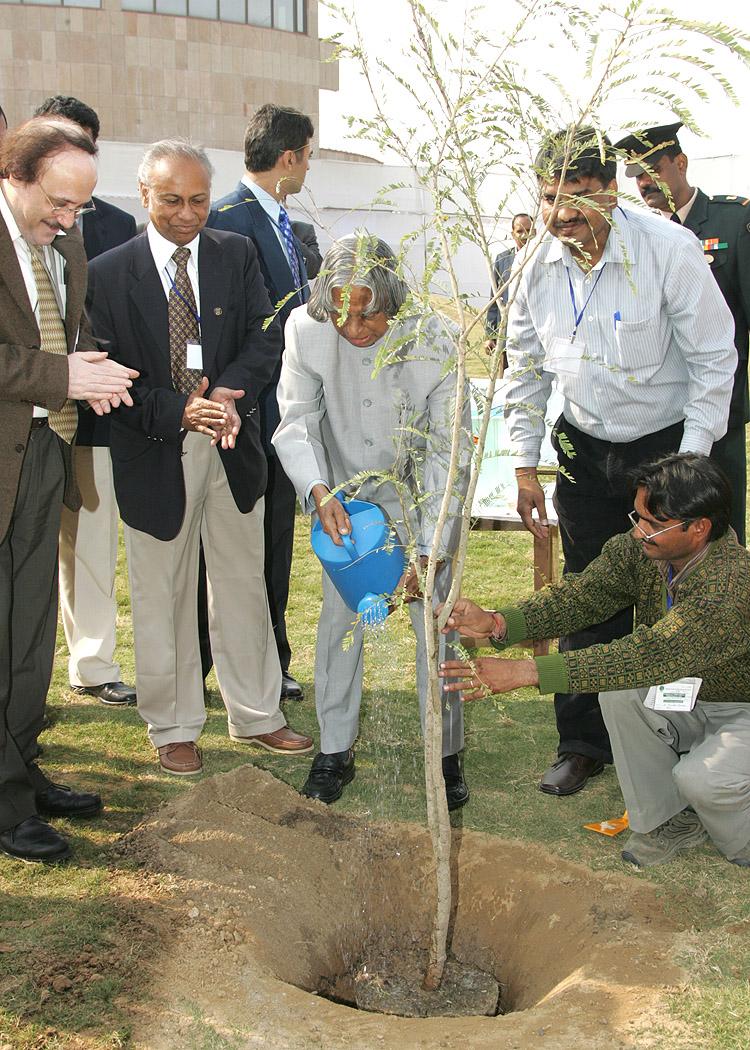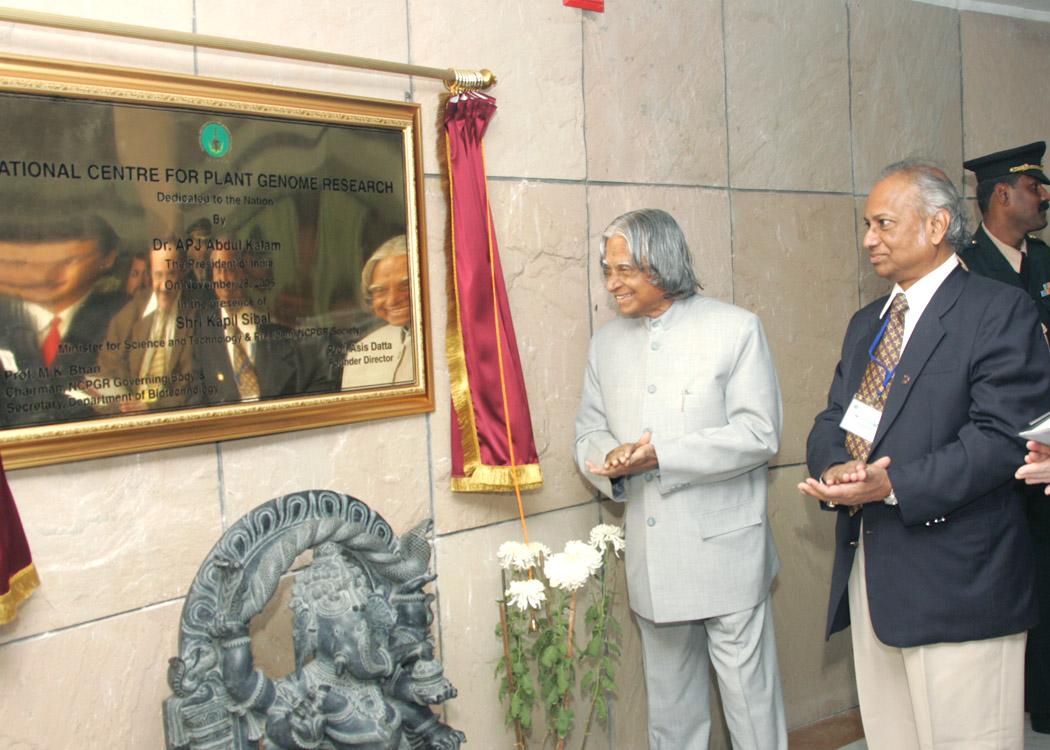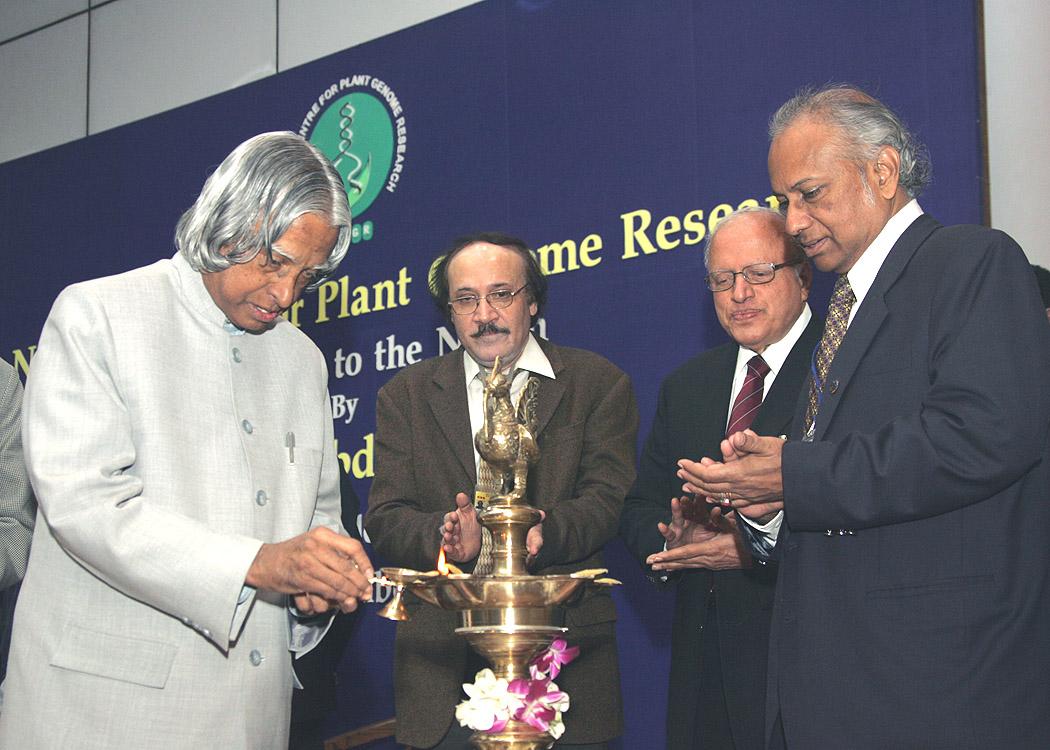Address At The Inauguration Of The South Asian Conference On Renewable Energy, New Delhi
New Delhi : 28-11-2005
Some Thoughts on Plant Genome Research
I am delighted to participate in the dedication ceremony of the National Centre for Plant Genome Research. My greetings to the members of National Centre of Plant Genome Research, bio-technologists, scientists, academicians, science planners and distinguished guests. I am happy to find that the Centre has undertaken an important programme on nutritional enhancement of Potato under its Nutritional Genomic Programme. It has been observed that the total protein content in transgenic potato tuber has considerably been increased. The Centre has also made satisfactory progress in cloning of D-manno-sidose gene from capsicum and tomato. Another important area pursued by the institute in producing low oxalate vegetables and other crops such as tomato, spinach and other crops like soybean and groundnut, will have an impact on the revenue generation capability of our farmers. I congratulate the scientists of the National Centre for Plant Genome Research on this accomplishment. The contribution of Indian bio-technologists in the International Rise Genome Sequencing Programme is noteworthy. I would like to discuss on the topic "Some Thoughts on Plant Genome Research".
Bio-factories
'Plant genomics' is the new emerging area of research, which deals with functional and structural definition of genes both in terms of their location in the genome and their expression for defining the precise regulation to control the whole metabolism. Thus this field opens up new avenues to modulate the gene expression in such a way that plants can be converted into proficient genotypes or varieties to be used as the bio-factories producing useful proteins, therapeutic molecules, nutritional compositions, stress tolerant varieties to meet the current and futuristic requirement of the society in eco-environment friendly manner.
Medicinal and aromatic plants
Medicinal and aromatic plants are emerging as the new opportunities of entrepreneurship for farmers and have become the resource for drugs, flavour and fragrances for pharma and aroma industries. The molecules responsible for aroma or drug activities are produced in these plants as secondary metabolites. Therefore, the understanding of metabolic pathways in these plants becomes a necessity to create useful genotypes. Such approaches which can lead to understanding of the complete network of metabolic pathways in the plant are referred as meta-bolomics. This approach enables increased production of desired molecule (drug) through nature?s route (the plant). Desirable recombinants are obtained to produce required, nutrition, drug, trait (character) through plant system which eliminates synthetic production. This would facilitate organic mode of production or multiplication of important drugs. By using plant Genomics knowledge new type of plants with desired traits need to be available to serve the society without adverse effects on the environment.
Development of Designer Crops
Relating the 'genome' of the plant with 'metabolome' is the emerging field of functional genomics and hence is very important for a medicinal and aromatic plants to develop designer crops which will specifically produce the drug molecules and accumulate them in large quantities for use by pharma industry.
Central Institute of Medicinal and Aromatic Plants (CIMAP) at Lucknow is working on the functional genomics research for highly important plants like anticancer plant Catha-ran-thus rose-us (Periwinkle), anti-malarial plant Arte-misia annua (Quinghao), pain therapeutics yielding plant Papa-ver som-ni-ferum (Opium poppy), revitalizing immuno-modulator plant Witha-nia somni-fera (Ashwagandha), traditionally most valued aromatic-cum-medicinal plant Oci-mum (Tulsi) and the mint yielding aromatic plant Mentha ar-ven-sis (Menthol mint), the plant which has also created history to place India on the top position for production and export of menthol competitively in the global market. I would suggest the National Centre for Plant Genome Research to work in collaboration with CIMAP, other medicinal and aromatic plant research centres universities and the pharma industries on the areas of genome research pertaining to medicinal and aromatic plants, and evolve new varieties with high value addition.
CIMAP has also dissected out the genomic component of Mentha arvensis and Mentha piperita, and isolated the genes responsible for key regulation in its pathway not only to produce larger amount of menthol but also for producing designer mints with variety of aromatic flavours useful right from confectionary to pharmaceutical purposes. The results will be of assistance to the farmers.
With National Centre for Plant Genomic Research (NCPGR), CIMAP has been a major collaborator in one of its priority medicinal plant called peri-winkle (Catha-ranthus roseus) which produces clinically proven anti-cancerous alkaloids named Vin-cris-tine and Vin-blastin. Through functional genomics approach some progress has been made to identify and isolate genes related to the biosynthetic pathway for these anticancer molecules. Designer Catha-ran-thus as agro-bioreactor is the dream target to produce anti-cancerous drugs in farmers? field. This should be taken up in India in mission mode, since many groups are working in this area worldwide.
Likewise, there are enormous opportunities between various plant science laboratories of the country on genomics research with defined targets which could range from nu-tra-ceutical crops rich in vitamins or essential amino acids, medicinal crops for fighting various diseases, making hill crop to grow in plains and vice-versa, enhancing yield of food crops several folds, disease and pest resistant crops or crops that can tolerate weather extremities like drought, flood, salinity, scorching heat, low temperature frost and so on. Crop varieties responding to organic mode of cultivation if can be developed using knowledge of plant genome would lead to great service to the humanity environment and soil health.
Ginger
I came across a book called "Ginger" written by an American, who is a friend of India. The author feels that the drug based on Ginger will replace aspirin and other similar medicines with no side effects and his mission is to propagate Ginger as a drug. He is assisting the production. After I finished reading the book I asked him, you are a friend of India, why your company is purchasing Ginger from other two countries in Asia and South America for making the drugs. He answered that there are twelve ingredients in Ginger, out of which six are very important from medicinal point of view. Indian ginger when analyzed, we find that four of these ingredients are missing. According to him, the reasons for this are, even though India produces large amount of ginger, farmers have not been trained about the right time of cultivation during the year, right soil characteristics, right duration of the crop, right nutrient to be added during its growth and the right type of water management and finally the right timing of harvesting. Ginger varieties of Indonesia or some other place can be studied and gene (s) responsible for production of desired molecules can be incorporated in Indian ginger using knowledge of plant genome. The quality of Ginger crop as a function of all the above parameters should be studied by the scientists and solution should be found using plant genomic research. Genomic research should also lead to ginger transferring into drugs.
Genomic Research to reinforce traditional medicine
Unlike the western agricultural system, the Indian food chain had health as an important component in herbal medicine like turmeric, neem, pepper, garlic etc., but due to the scientific process of evolving allopathy medicine facing extreme competition in India, our medicinal plants have resurfaced from the western source through systematic scientific processing, packaging and marketing. The Plant genome researchers can study these plants and genomic signature which will enable us to patent these plants for medicinal use with adequate protection of intellectual property rights. You are already aware of the struggle India has to face on the neem patenting rights.
Nutritional research
Throughout the world there are three major nutritional deficiency disorders or diseases namely Iron deficiency ? women (mostly 50% of the population) by and large are anemic at one or the other period in their life span. This affects their performance and health. There is need to overcome this by developing Iron rich crops (vegetables, fruits etc.) using knowledge of plant genome. Another major deficiency disease - Impaired vision / eye sight, night blindness is mainly caused by deficiency of Vitamin 'A' (Carotenoide). Plant genome research like in potato and rice crop should cover large number of fruits and vegetables to provide enough Vitamin 'A'. This Vitamin should also not get destroyed during processing of the produce on higher level of heating. This is the challenge for the Scientists working on enhancement of Vitamin 'A' in crops using plant genome knowledge. The third major problem is Iodine deficiency leading to Thyroid etc. The Iodine content of Iodine rich crop need to be enhanced / improved by using the knowledge generated on plant genome centres.
The enhancement in nutrition content or drug molecule in selected crops should meet the requirement of society. It should be commercially viable rather than being used in the extension farms. Our plant genome scientists should become civic scientists in this regard.
Suggestions
I have the following suggestions to make for the plant genome scientists assembled in this gathering.
1. India is producing 12% of the world cotton production, however certain types of quality cotton, is not produced in Indian farms. There is a need for the plant genome scientists to characterize such varieties of cotton, so that Indian farmers can double their revenue through production of such varieties.
2. During my visit to J&K, I found in certain areas, large amount of land is available and water is available. But plants do not grow during winter season, due to extreme cold. Apart from Poly house farming, it is essential to find special varieties of vegetables, fruits or herbal plants which can be grown in these areas under frost conditions. Plant genome scientists can take up research projects in this direction.
3. Presently, the Jatropha Curcas produced in different parts of the country yields around 28 to 30% of the seed weight as oil. There is a promise to increase the oil content to more than 50%. Plant genome scientists to take up the challenge and find such varieties, which will be a wealth generator for our farmers. Certain type of Jatropha grows in dry land and cattle don?t graze. This has lead to the spreading of information that these plants are poisonous. It is very important for plant genome scientist to clarify the reason why cattle do not graze Jatropha plant and establish that there is no toxic effect in the end product.
4. When I visited North East region of the country, I found that the bamboo clusters are reaching the flowering stage (say) after four decades and create multiple environmental problems. Can the plant scientists find the solution through plant genomics for preventing such flowering and the resultant problems to the other crops and farmers?
5. I learnt Rubber Research Institute, Kottayam that due to the requirement of certain special properties we are still producing synthetic rubber. It is essential to develop a genomically modified form of natural rubber which can replace the requirement of synthetic rubber for special applications. This will reduce the atmospheric pollution created by synthetic rubber factories and eliminate the need for importing some intermediate inputs.
6. Genome researchers may like to study and produce seeds for genetically modified orchids, anthurium and other ornamental plants which can be grown in Jammu and Kashmir and North Eastern regions. This product should be a competitor in the world market.
Conclusion
Yesterday I was reading a book 'Visions' written by Michio Kaku. I would like to read a para from that book which is relevant to you. Quote: "With the basic laws of the quantum, DNA and computers discovered we are now embarking upon a much greater journey, one that ultimately promises to take us to the stars. As our understanding of the fourth pillar, space-time increases, this opens up the possibility in the far future of being able to become masters of the space and time". As plant genome researchers you have got tremendous business in the field of DNA.
In India we are now producing 200 Million tons of food grains, by 2020 we would be needing around 400 million tons of food. This will have to be accomplished with the reduced land, reduced water availability and with reduced agriculture work force. Plant genome scientist have an important role to play in finding innovative solutions to this problem by evolving new genetically modified varieties of seeds for rice, wheat and pulses. Also they have to evolve certain special varieties which will enable retention of the nutritional properties during the processing of the grains into food products.
I dedicate the national center for plant genome research to the nation and wish the scientists? success in all their missions of providing vital scientific results needed for national development. May God bless you.





